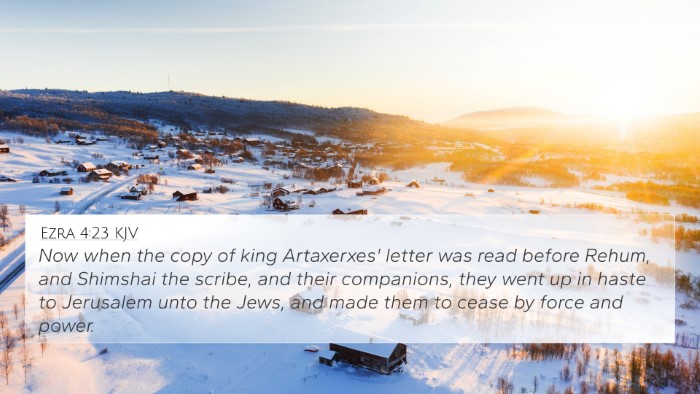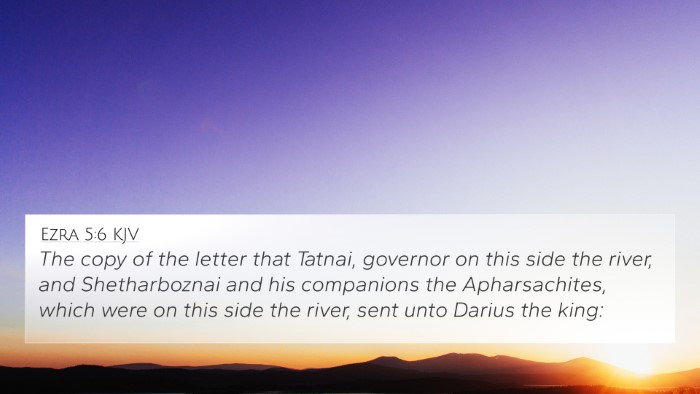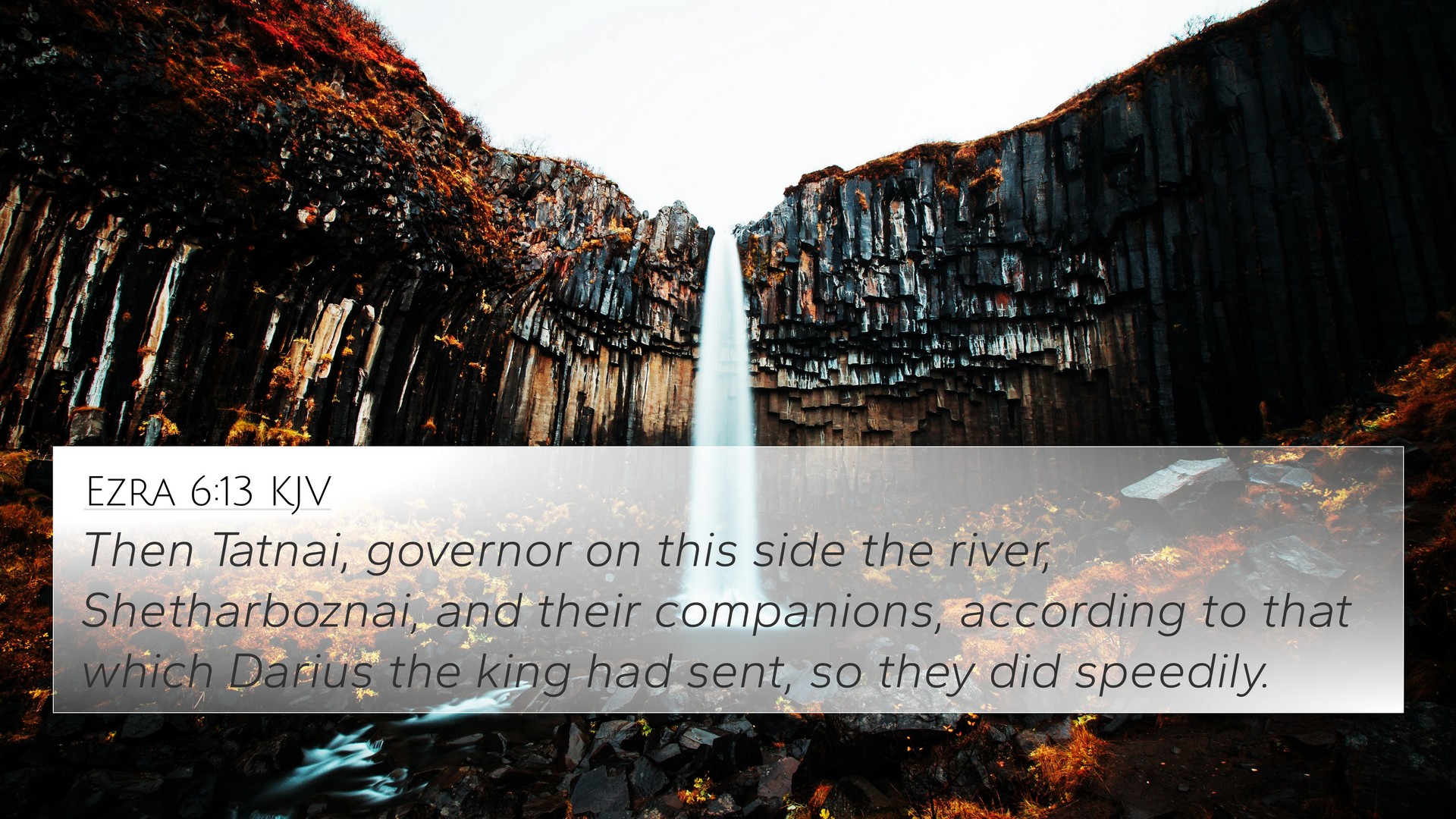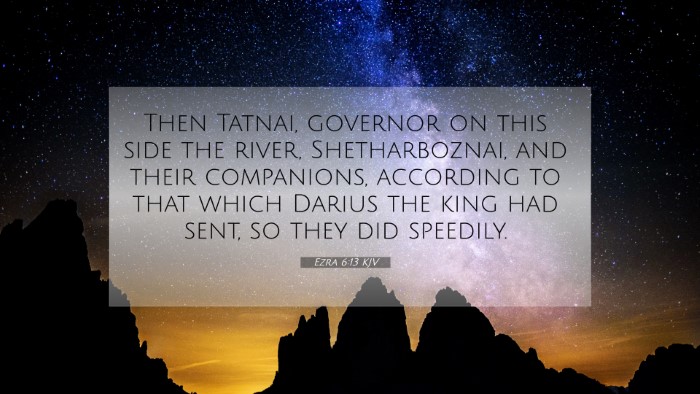Old Testament
Genesis Exodus Leviticus Numbers Deuteronomy Joshua Judges Ruth 1 Samuel 2 Samuel 1 Kings 2 Kings 1 Chronicles 2 Chronicles Ezra Nehemiah Esther Job Psalms Proverbs Ecclesiastes Song of Solomon Isaiah Jeremiah Lamentations Ezekiel Daniel Hosea Joel Amos Obadiah Jonah Micah Nahum Habakkuk Zephaniah Haggai Zechariah MalachiEzra 6:13 Similar Verses
Ezra 6:13 Cross References
Then Tatnai, governor on this side the river, Shetharboznai, and their companions, according to that which Darius the king had sent, so they did speedily.
Uncover the Rich Themes and Topics of This Bible Verse
Listed below are the Bible themes associated with Ezra 6:13. We invite you to explore each theme to gain deeper insights into the Scriptures.
Ezra 6:13 Cross Reference Verses
This section features a detailed cross-reference designed to enrich your understanding of the Scriptures. Below, you will find carefully selected verses that echo the themes and teachings related to Ezra 6:13 KJV. Click on any image to explore detailed analyses of related Bible verses and uncover deeper theological insights.

Ezra 4:9 (KJV) »
Then wrote Rehum the chancellor, and Shimshai the scribe, and the rest of their companions; the Dinaites, the Apharsathchites, the Tarpelites, the Apharsites, the Archevites, the Babylonians, the Susanchites, the Dehavites, and the Elamites,

Ezra 6:6 (KJV) »
Now therefore, Tatnai, governor beyond the river, Shetharboznai, and your companions the Apharsachites, which are beyond the river, be ye far from thence:

Ezra 4:23 (KJV) »
Now when the copy of king Artaxerxes' letter was read before Rehum, and Shimshai the scribe, and their companions, they went up in haste to Jerusalem unto the Jews, and made them to cease by force and power.

Ezra 5:6 (KJV) »
The copy of the letter that Tatnai, governor on this side the river, and Shetharboznai and his companions the Apharsachites, which were on this side the river, sent unto Darius the king:

Esther 6:11 (KJV) »
Then took Haman the apparel and the horse, and arrayed Mordecai, and brought him on horseback through the street of the city, and proclaimed before him, Thus shall it be done unto the man whom the king delighteth to honour.

Job 5:12 (KJV) »
He disappointeth the devices of the crafty, so that their hands cannot perform their enterprise.
Ezra 6:13 Verse Analysis and Similar Verses
Understanding Ezra 6:13
Ezra 6:13 states:
"Then Tattenai, governor of the region beyond the River, Shethar-Bozenai, and their companions diligently did according to what Darius the king had sent." (Ezra 6:13, NKJV)
Verse Summary
This verse discusses the response of Tattenai and his colleagues to King Darius' decree regarding the rebuilding of the temple in Jerusalem. Their diligent compliance signifies the importance of authority and governance in the completion of God's work.
Insights from Public Domain Commentaries
-
Matthew Henry:
Henry emphasizes the obedience of the Persian officials as they respected the authority of King Darius. He notes that such actions reveal the providence of God in allowing the Jewish people to rebuild their temple. This compliance represents a significant turning point in Jewish history, signifying God's favor upon His people.
-
Albert Barnes:
Barnes points out that the phrase "diligently did according to what Darius the king had sent" highlights the seriousness with which Tattenai treated the king's orders. He connects this to the broader theme of divine support for those engaged in God’s work, providing a clear illustration of how God orchestrates events in favor of His people.
-
Adam Clarke:
Clarke elaborates on the significance of the governor's actions, noting that the support from the Persian Empire was essential for the rebuilding of the temple. He argues that this scripture illustrates not only the cooperation of earthly authorities in divine matters but also the overarching plan of God for Israel's restoration.
Cross-References Related to Ezra 6:13
- Ezra 5:17: "Now, therefore, if it seems good to the king, let a search be made in the king’s treasure house, which is there in Babylon, whether it is so that a decree was issued by King Cyrus to build this house of God at Jerusalem." - This prior verse showcases the request for validation of King Cyrus's order, leading up to Darius's confirmation.
- Ezra 6:1: "Then King Darius issued a decree, and a search was made in the Archives where the treasures were stored in Babylon." - Highlights the endorsement of rebuilding by the Persian kings.
- Haggai 1:1: "In the second year of Darius the king, on the first day of the sixth month, the word of the LORD came by the prophet Haggai to Zerubbabel." - Illustrates the timing and prophetic encouragement during the rebuilding process.
- 1 Peter 2:13: "Therefore submit yourselves to every ordinance of man for the Lord’s sake, whether to the king as supreme..." - This echoes the theme of submission to authority, relevant in the context of Ezra 6:13.
- Nehemiah 2:6: "Then the king said to me, 'The queen also sitting beside him, 'How long will your journey be? And when will you return?' So it pleased the king to send me..." - Illustrates the role of the king's favor in rebuilding efforts, similar to Darius's action in Ezra.
- Isaiah 44:28: "Who says of Cyrus, 'He is My shepherd, and he shall perform all My pleasure, saying to Jerusalem, 'You shall be built,' and to the temple, 'Your foundation shall be laid.'" - References God's orchestration through Cyrus, setting the precedent for later events in Ezra.
- Jeremiah 29:10: "For thus says the LORD: ‘After seventy years are completed at Babylon, I will visit you and perform My good word toward you, and cause you to return to this place.’" - Reaffirms God's promise for restoration after exile, linking to the actions of Darius.
Comparative Analysis
Ezra 6:13 offers a glimpse into the historical narrative of the Jewish people’s return and reconstruction efforts, and it prompts analysis of various themes:
- Theme of Obedience: The obedience demonstrated by Tattenai reflects necessary compliance to God's divine plan.
- Divine Providence: The passage underlines the role of divine intervention in the affairs of nations to achieve the restoration of Jerusalem.
- Authority and Governance: The interactions between the Jewish leaders and Persian officials underline the importance of governance in fulfilling God's covenant with His people.
Thematic Connections and Insights
The action taken by Tattenai not only fulfills a historical event but also encourages believers today to seek and recognize God's handiwork through earthly authorities. Scripture supports this notion across various books, displaying a pattern of divine oversight.
- Faithful Leadership: Leaders like Tattenai acting in accordance with God's plan draw parallels to contemporary leadership in the church.
- Hope and Restoration: The resilience of the Jewish people amidst foreign governance serves as an encouragement to believers facing challenges.
- Covenant Fulfillment: The historical significance in the context of God's covenantal promises sparks deeper queries into how contemporary events parallel biblical narratives.
Conclusion: Ezra 6:13 encapsulates a critical moment in the history of Israel, where obedience to God and respect for authority intersect. Through careful examination, one can reveal the profound connections between scripture and the relevance of divine fidelity in human affairs.



